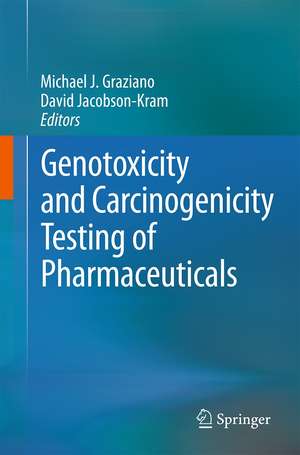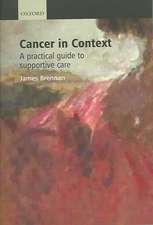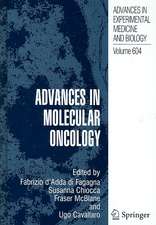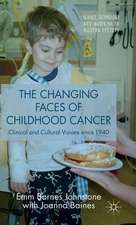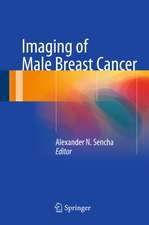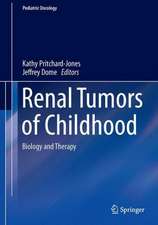Genotoxicity and Carcinogenicity Testing of Pharmaceuticals
Editat de Michael J. Graziano, David Jacobson-Kramen Limba Engleză Paperback – 13 noi 2015
With contributions from recognized experts in the pharmaceutical industry and health authorities, this volume presents a balanced view on the interpretation and application of genotoxicity and carcinogenicity regulatory guidances.
Genotoxicity and Carcinogenicity Testing of Pharmaceuticals is a valuable resource for scientists, regulators, and consultants that are engaged in the conduct, reporting, and review of nonclinical studies. This book will also help academicians better understand and appreciate the complexity of the regulations and breadth of toxicology research that are necessary to support the development and marketing of new drugs.
Preț: 716.09 lei
Preț vechi: 753.77 lei
-5% Nou
Puncte Express: 1074
Preț estimativ în valută:
137.02€ • 142.78$ • 113.46£
137.02€ • 142.78$ • 113.46£
Carte disponibilă
Livrare economică 13-27 martie
Preluare comenzi: 021 569.72.76
Specificații
ISBN-13: 9783319220833
ISBN-10: 3319220837
Pagini: 206
Ilustrații: X, 206 p. 15 illus., 8 illus. in color.
Dimensiuni: 155 x 235 x 15 mm
Greutate: 0.43 kg
Ediția:1st ed. 2015
Editura: Springer International Publishing
Colecția Springer
Locul publicării:Cham, Switzerland
ISBN-10: 3319220837
Pagini: 206
Ilustrații: X, 206 p. 15 illus., 8 illus. in color.
Dimensiuni: 155 x 235 x 15 mm
Greutate: 0.43 kg
Ediția:1st ed. 2015
Editura: Springer International Publishing
Colecția Springer
Locul publicării:Cham, Switzerland
Public țintă
Professional/practitionerCuprins
Introduction.- History and Current Regulatory Requirements.- Genotoxicity Testing of API and Impurities.- New Emerging Genotoxicity Tests.- Carcinogenicity Testing of Small Molecules.- Alternatives to the 2-Year Rodent Studies.- Addressing Positive Findings in Carcinogenicity Studies.- Investigating Tumor Signals in Clinical Trials.- Tumor Promoters.- Carcinogenicity Testing of Biologics.- In Silico Predictive Tests.
Notă biografică
Michael J.Graziano, Ph.D., has more than 27 years of experience as atoxicologist in the pharmaceutical industry. He is currently Vice President ofDrug Safety Evaluation at Bristol-Myers Squibb, where he is responsible for thenonclinical safety testing for all drugs within the BMS portfolio. Within thepast 6 years, he has provided nonclinical support for 8 new drug approvals.Prior to joining BMS in 2003, he was Director of Anticancer and AntibacterialToxicology Programs at Pfizer Pharmaceutical Research, in Ann Arbor, MI, and withthe Parke-Davis Pharmaceutical Research Division/Warner-Lambert Company. He isthe author or co-author of more than 90 scientific publications and abstracts,many dealing with the nonclinical safety of new therapeutic agents. Dr.Graziano is a member of the IQ DruSafe Leadership Group, the PhRMA Clinical andPreclinical Development Committee, the EFPIA PreclinicalSafety DevelopmentCommittee, and HESI. He is also the PhRMA Deputy Topic Leader for the currentICH S1 Expert Working Group. Dr. Graziano received a B.S. in animal sciencefrom Rutgers University, a M.S. in veterinary toxicology from Louisiana StateUniversity, and a Ph.D. in toxicology from the University of Kentucky, and wasa Post-Graduate Research Toxicologist at the University of California,Berkeley. He is also a Diplomate of the American Board of Toxicology.
DavidJacobson-Kram received his Ph.D. in embryology from the University ofConnecticut; he then went on to serve as a staff fellow at the NationalInstitute on Aging. After leaving the National Institutes of Health, Dr.Jacobson-Kram joined the faculty of the George Washington University School ofMedicine and then later, Johns Hopkins University Oncology Center. During thissame period he served, on a part-time basis, asa geneticist in the Office ofToxic Substances at the Environmental Protection Agency and as Acting BranchChief in the EPA's Office of Research and Development. Dr. Jacobson-Kram servedas the Vice President of the Toxicology and Laboratory Animal Health Division atBioReliance Corporation, a contract testing laboratory, from 1988 until 2003.From 2003 until 2014, he served as the Associate Director of Pharmacology andToxicology in the FDA’s Office of New Drugs. Over the past thirty years, he hasserved as principal or co-principal investigator on several NIH grants andgovernment contracts and published widely in the areas of genetic and moleculartoxicology. Dr. Jacobson-Kram has served as council member, treasurer, andchairman of the Genetic Toxicology Association, executive council member to theEnvironmental Mutagen Society, Editor of Cell Biology and Toxicology,and as a member of NIH special study sections. In 1996 he became a Diplomate ofthe American Board of Toxicology.
DavidJacobson-Kram received his Ph.D. in embryology from the University ofConnecticut; he then went on to serve as a staff fellow at the NationalInstitute on Aging. After leaving the National Institutes of Health, Dr.Jacobson-Kram joined the faculty of the George Washington University School ofMedicine and then later, Johns Hopkins University Oncology Center. During thissame period he served, on a part-time basis, asa geneticist in the Office ofToxic Substances at the Environmental Protection Agency and as Acting BranchChief in the EPA's Office of Research and Development. Dr. Jacobson-Kram servedas the Vice President of the Toxicology and Laboratory Animal Health Division atBioReliance Corporation, a contract testing laboratory, from 1988 until 2003.From 2003 until 2014, he served as the Associate Director of Pharmacology andToxicology in the FDA’s Office of New Drugs. Over the past thirty years, he hasserved as principal or co-principal investigator on several NIH grants andgovernment contracts and published widely in the areas of genetic and moleculartoxicology. Dr. Jacobson-Kram has served as council member, treasurer, andchairman of the Genetic Toxicology Association, executive council member to theEnvironmental Mutagen Society, Editor of Cell Biology and Toxicology,and as a member of NIH special study sections. In 1996 he became a Diplomate ofthe American Board of Toxicology.
Textul de pe ultima copertă
This book provides an overview of the nonclinical testing strategies that are used to asses and de-risk the genotoxicity and carcinogenicity properties of human pharmaceuticals. It includes a review of relevant ICH guidelines, numerous case studies where follow-up studies were conducted to further investigate positive findings, and practical considerations for the use of alternative and emerging tests.
With contributions from recognized experts in the pharmaceutical industry and health authorities, this volume presents a balanced view on the interpretation and application of genotoxicity and carcinogenicity regulatory guidances.
Genotoxicity and Carcinogenicity Testing of Pharmaceuticals is a valuable resource for scientists, regulators, and consultants that are engaged in the conduct, reporting, and review of nonclinical studies. This book will also help academicians better understand and appreciate the complexity of the regulations and breadth of toxicology research that are necessary to support the development and marketing of new drugs.
With contributions from recognized experts in the pharmaceutical industry and health authorities, this volume presents a balanced view on the interpretation and application of genotoxicity and carcinogenicity regulatory guidances.
Genotoxicity and Carcinogenicity Testing of Pharmaceuticals is a valuable resource for scientists, regulators, and consultants that are engaged in the conduct, reporting, and review of nonclinical studies. This book will also help academicians better understand and appreciate the complexity of the regulations and breadth of toxicology research that are necessary to support the development and marketing of new drugs.
Caracteristici
Provides context and real case studies to help address critical preclinical safety issues Provides an overview of alternative and emerging genotoxicity and carcinogenicity tests Written by well recognized experts in the pharmaceutical industry and regulatory agencies with experience and insights from individuals who have made many critical decisions on the safety of new drugs
